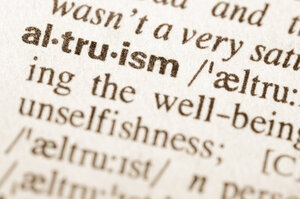Op-eds

Op-eds published in KCGH, NVTG & OIGT newsletter
Every month, the joint newsletter from the Knowledge Centre Global Health (KCGH), the professional association for global health professionals NVTG, and the training institute OIGT is sent out. In addition to the latest news, upcoming webinars, and other events, there is also a column by an AIGT'er to be read. On this page, you can find all previously published columns.
You can sign up for the newsletter at the bottom of this webpage. Would you like to write a column too? Then please get in touch with us at ofni.[antispam].@kcgh.nl.
‘Setting learning goals’ seems to be one of the most important tasks of a trainee in International Health and Tropical Medicine. Ever since I started my education in this field, I have spent quite some time formulating and re-formulating the skills that in my opinion are valuable for working as a doctor in a low-resource setting – and I spent even more time looking for ways to master these skills in the wealthy Dutch health care system. 
But as I am finding out along the way, the variety of skills that a doctor in International Health and Tropical Medicine must be competent in is enormous. For example, we are trained in planetary health, cultural sensitivity, refugee care, infectious diseases, and of course surgery, paediatrics, gynaecology, obstetrics, and so forth. Spending sufficient time and energy on all these topics can be a challenge for ‘jack of all trades’ doctors like me.
And in the meantime, clinical work continues – my regular job of patient care goes on. But especially during these busy days of clinical work, in which it sometimes feels like all my attention has drifted away from my learning goals, I learn the most – just from talking to my patients.
I discovered this a while ago when I was taking care of a Ukrainian refugee with unspecific neurological complaints and bilateral papillary oedema. He was put through a lot of diagnostic tests without any results – we simply could not find the cause of his problem. He was diagnosed with functional neurological disorder (FND), to which probably a lot of stress factors have contributed. He fled his homeland with his mum, leaving the rest of his family behind. The two now live in their second shelter in the Netherlands, after their first Dutch landlord put them out on the street.
He told me this in fluent Dutch, which he learned at a regular primary school where he will enter the final grade next year. Not just his language skills but above all his adaptability impressed me a lot, and I am sure that these capacities will enable him to combat his FND perfectly. By showing me his skills and telling me his story he taught me the following: I don’t always have to find the path to my learning goals myself – reality can already be a high road towards them.
Judith Polak is an NVTG member, AOIS AIGT and currently working as a Resident Tropical Medicine at Rijnstate Hospital in Arnhem.
Global Health work excites me but also perplexes me often. When am I truly doing good? Am I not unintentionally hindering local efforts? Or neglecting long-term consequences? Or am I mostly feeding my latent saviour complex? 
And it gets worse… is my ‘doing good’, good enough?
Recently, I have been reading books on effective altruism, such as ‘Doing Good Better’ by William Macaskill. Great read – I would highly recommend it. However, it spiralled me deeper into the ‘Dunning-Kruger valley of despair’.
Effective altruism is a philosophy that aims to maximise the impact of helping others. Some advocate for strategies such as ‘earning to give’. This means I should stop gallivanting, work as much as possible in a high-paying consultancy job (or something similar) and donate a proportion of my salary to the most effective charities. It was humbling to read, and frankly a bit depressing.
But it did make me question what is truly effective. Effective altruists argue that I should put my efforts into solving an issue that is big in scale, solvable and neglected. For most of my training, however, I primarily focus on technical skills as they might prove useful during clinical practice in low-resource settings. But when I consider impactful and QALY-effective interventions, I should perhaps focus my time on how to deworm as many children as I can, rather than how to perform a hysterectomy or a complex caesarean.
Granted, the heart wants what the heart wants. And most of us are clinicians, not public health workers. Still, I cannot help but wonder: are we, young global health professionals, prioritising effectiveness enough over what sounds and feels impressive? Perhaps a modern global health professional, with an honest intention of having a positive impact, should strive to be a bit more utilitarian? Doctors of low-hanging fruit! Too bad I am too late for the suggestion round for the renaming of NVTG.
Soon the Core Course in Public Health and Health Equity (CCPH-HE, formerly NTC) will start as a part of my training. Again, it is a fancy new name, which brings me excitement as perhaps someone will provide me with answers. Hopefully, I will soon find my big, solvable, and neglected issue.
Tip: via this website, it is possible to request a free book on this topic.
Sjoerd Verschoor is an NVTG member and currently working as resident Global Health & Tropical Medicine at IJselland Ziekenhuis in Capelle aan den IJssel.
Non-Communicable Diseases
By Arie Glas, Mulanje Mission Hospital
A woman walks into the diabetes/hypertension clinic at the hospital in Malawi where I work. She is a farmer and business lady, selling groceries in her village. How are you, madam, I ask, quickly reviewing her records; a well-designed A4 with all relevant information. She has been seen by most of the clinical team here, often another clinician each visit.
Are you exercising? I ask... feeling slightly embarrassed to ask this of a rural farmer who surely does more manual labour than I ever did. Yet, despite a low standard of living, this patient is seriously overweight. Communities here struggle with high rates of stunting and even acute malnutrition, but overweight and obesity are very common too.
We discuss a healthy diet, using the African heritage diet poster, and a visit to the physio for weight loss classes. Time is short; we see a hundred patients in a morning, and the wards need attention too, where over half of all admissions now occur because of vascular disease, diabetes and cancer.
I was not well prepared for this, coming as an AIGT years ago, and the system I work in and try to shape was notprepared either. There was no clear protocol for NCDs, and our main database is still haphazardly formed into anExcel with clinical outcomes. Clinicians must write each note twice; in the patient’s record too.
But patient education now happens via video on a TV screen: this is always comprehensive and helps the nurses save time. The hospital now employs an optometrist and rehabilitationist. In the years following intense focus on NCDs through training, mentorship, and building improvements, we do see improved blood pressure and diabetes control, although compliance remains a challenge. Yet, since 25% of people in this area have hypertension, with 2,500 regular attendants to the clinic we know only 10% of those in need are currently in care. This is an enormous health challenge.
So, urgent upscaling is needed. Clinics deserve strong government support, so they can grow and close the gap, with strong digital record systems for efficiency and outcome tracking. The HIV programme has shown the way. Continuity of care is critical, and curricula need updating: training mostly aimed at acute infections and surgery does not prepare well for long-term chronic care.
Diet diversification, obesity and smoking must be a topic of debate in Malawi, and the education sector needs to be involved now: healthy school meals, sports and knowledge are part of the solution.
My patient and I set a target of 1 kilogram weight loss a month. Like many, she is on four anti-hypertensives and our common goal is to get that down to three. This may well work; we have seen that with consistent, single-dose drugs, weight loss and exercise, many patients’ sugar and blood pressure values can dramatically improve. See you again in three months!
Don’t hate the player, get them on your team
‘It’s pointless to invest in health systems like Nigeria’s. Such countries might end up joining BRICS. China is already snatching the raw materials over there’.
April 2024, I find myself listening to a debate on the Dutch Global Health strategy. I’m fighting the headache from the ‘Dutch people first’ rhetoric from what is now the biggest political party in the Netherlands.
Fast forward to the end of the year, rounding up the core course Public Health and Health Equity (formerly NTC), I find myself in fierce group discussions on health equity and decolonisation.
Two worlds that feel miles apart.
Throughout the course I have learned a lot - not just about global health but also about myself and how to navigate in such an international and diverse group. But in the end, most of these discussions are with like-minded people, preaching to our own choir. 
Now, I am preparing to be released into the ‘real’ world again, outside of the global health bubble, where meritocratic beliefs seem more common than equitable ones. Unfortunately, after an intense training that mainly focuses on the complexity of global health issues, I sense more ‘idealist fatigue’ among my colleagues than when we started.
But what I feel we still lack at the end of the 3-year training are skills such as effective communication, relationship building or leadership – a toolbox for activism. And to clarify: not the kind of activism that involves shaming your fellow global health colleague for expressing opinions that are not progressive enough, which I sometimes witnessed at my course. I admire and envy many activists, but spare me the moral purists. What we need is a toolbox for activism that can engage the outside world.
Perhaps activism with less moral blaming, and more moral reframing. To reach, not preach.
Because there is always common ground. For instance, maybe some selfish economic rhetoric to convince a broader public to engage in equitable policy, could be acceptable for now. If that’s what it takes.
The future curriculum should shift more focus to these advocacy skills, as there’s nothing soft about soft skills. Raising skilled global health advocates will prove valuable for the future of the training as well, considering the current political climate and the hard-fought individual funding that is expiring in 2026.
‘There's so many different worlds
So many different suns
And we have just one world
But we live in different ones’
Mark Knopfler, Brothers in Arms, 1985.
Contact
Kenniscentrum Global Health (KCGH)
Arthur van Schendelstraat 650
3511 MJ Utrecht
ofni.[antispam].@kcgh.nl
KVK 78717590
KCGH
The KCGH (Knowledge Centre for Global Health) was established by the NSGH (formerly known as NVTG) and the OIGT (Training Institute International Health and Tropical Medicine) to make global health knowledge accessible and usable for the Dutch healthcare sector. KCGH is subsidised by the Ministry of Health, Welfare, and Sport.
Read here our privacy statement.
Subscribe to our newsletter!

